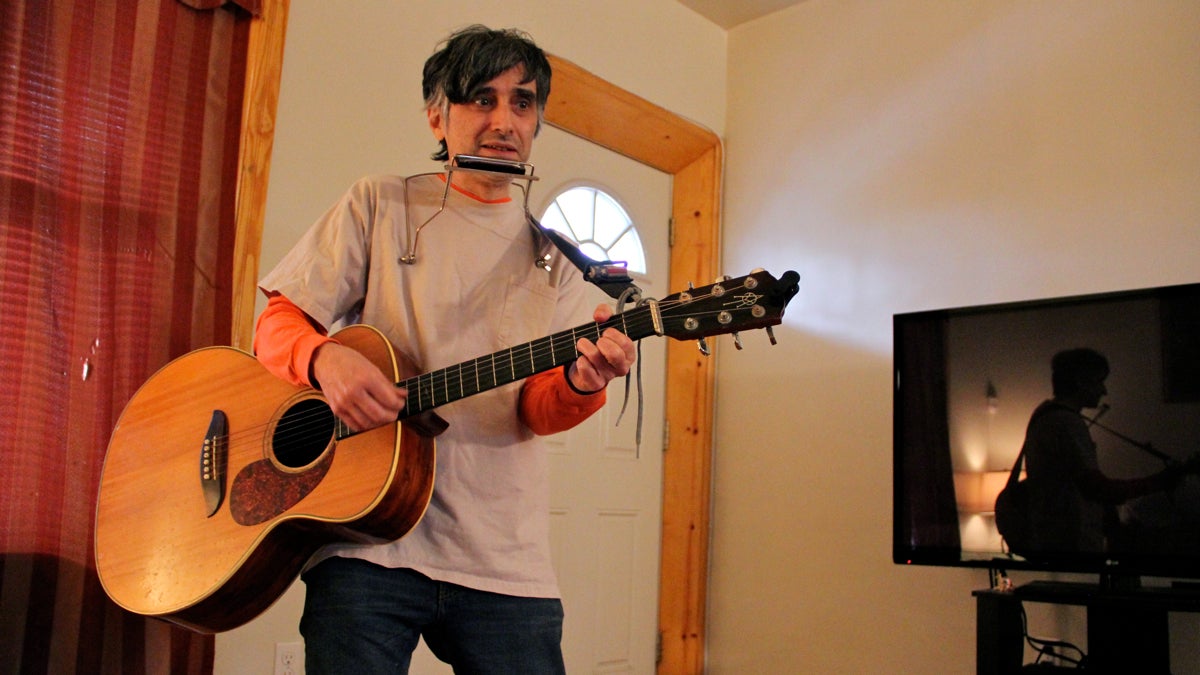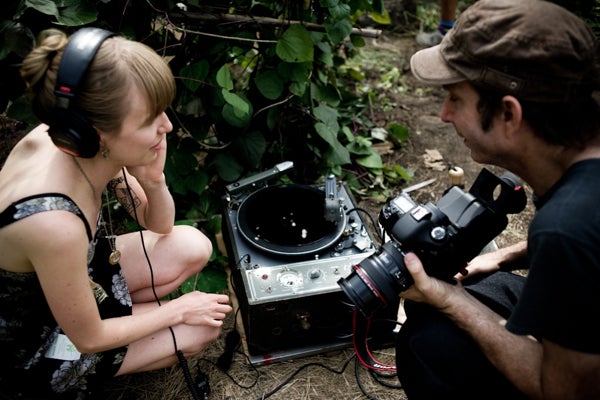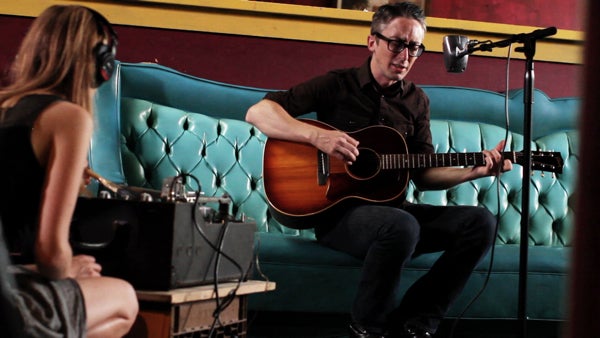Turning the tables on technology with ’78 Project’ recordings
Listen
Joe Genaro, better known as Joe Jack Talcum of the Dead Milkmen, performs the folk song Railroad Bill. (Emma Lee/WHYY)
Some Philadelphia filmmakers and musicians are showing their love of old records by recording their own on antique equipment.
Joseph Genaro, aka Joe Jack Talcum of the band The Dead Milkmen, was invited to participate in “The 78 Project,” a web series and now a documentary film, hatched by two Philadelphia natives.
Producers Alex Steyermark and Lavinia Jones Wright have been lugging around a 1930s acetate record cutter to record musicians performing tunes from the American folk songbook.
Genaro worked up a version of “Railroad Bill,” practicing on a cassette recorder to mimic the old acetate technology.
He’s got a pistol
As long as his arm –
He shot every pig on Sheriff Crowley’s farm –
And it’s ride, ride, ride…
The protagonist of the song might be a degenerate criminal or an outlaw folk hero.
“There are no two versions that have the same set of lyrics,” said Genaro, who has been downloading as many versions of the song as he can. “It sounds like people are just making up lyrics, and making up rhymes.”
On Thursday night, Genaro will record directly to an acetate disc in front of an audience, immediately following a screening of Steyermark and Wright’s documentary, “The 78 Project.”
 The 78 Project creators Lavinia Jones Wright and Alex Steyermark prepare to make a recording. (Sarah Law/for The 78 Project)
The 78 Project creators Lavinia Jones Wright and Alex Steyermark prepare to make a recording. (Sarah Law/for The 78 Project)
Those familiar with records will probably know that they are made of vinyl and spin at 33 1/3 revolutions per minute, or at 45 for a single. A 78 spins more than twice as fast – 78 rpm — and is made of acetate, a far heavier and more brittle material than vinyl. A disk can hold only about three minutes of sound.
Nobody cuts 78s anymore. It is technology that became obsolete some 75 years ago.
“I love records, I’ve loved them since I was a little kid. My mom had 78s and I used to play those,” said Genaro. “The idea that this machine still exists, and you can do this, is appealing.”
Following in the footsteps of Alan Lomax
He’s not alone. With Presto acetate 78 record cutters in hand, Steyermark and Wright have traveled the country on recording jaunts, just like their hero Alan Lomax, who famously made seminal folk and blues recordings in America in the late 1930s. He used the same technology – a Presto.
“The operation is relatively simple,” said Wright, who handles the sound recording while Steyermark shoots video. “One microphone, which sends a signal to the needle. It’s matter of determining volume levels, dropping the needle, and continually brushing away the acetate chip that flies up as the needle cuts the groove.”
They have recorded well-known musicians, including Rosanne Cash, Richard Thompson and Jack White, and little-known people such as Emma Rae Bowen, a 16-year-old guitarist and singer from Tennessee and the Rev. John Wilkins, whose father made a similar recording with Lomax.
The artists all had the same instructions: pick a song from the public domain, and record it to disc in one take. No re-dos, no overdubs.
“Artists now are so used to eliminating risk from the process of creating a recording – there’s the opportunity to erase and redo,” said Steyermark. “We don’t give them that. They’re suddenly exposed and vulnerable. One of the things we didn’t anticipate is how emotional that is for them.”
 John Paul Keith of the alternative country band The V-Roys, performs while Lavinia Jones Wright operates the Presto disc recorder at the Hi-Tone in Memphis. (Sarah Law/for The 78 Project)
John Paul Keith of the alternative country band The V-Roys, performs while Lavinia Jones Wright operates the Presto disc recorder at the Hi-Tone in Memphis. (Sarah Law/for The 78 Project)
Just one take with the chance of ambiance
The recording is influenced by how the machine feels on a particular day. “Like anything mechanical, they all have personalities,” said Wright. It can turn out a song sounding warbly, or muffled, or as crystal clear as a modern digital recorder.
One band, a five-piece called The Wandering, recorded to the Presto in the alley behind Joe’s Pub in Manhattan. The Presto was affected by subsonic vibrations coming from the subway under the street, making the sound wobble for a few seconds.
“We have come to see those anomalies as the character of these recordings,” said Wright. “We anticipate them, in an excited way. ‘What do you think your noise is going to be?’ We’ve had sirens, birds, foot tapping. We had Siri once, when someone sat on their cell phone.”
The Thursday night event at the International House in West Philadelphia will feature the audience, whose coughing, shifting, hooting and clapping will influence the Presto in perhaps unexpected ways.
“This process is an excuse to bring all these people together around this shared, transformative experience of cutting a record in one take,” said Steyermark.
WHYY is your source for fact-based, in-depth journalism and information. As a nonprofit organization, we rely on financial support from readers like you. Please give today.





